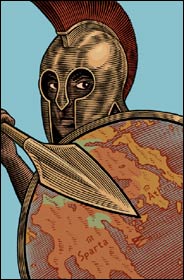American Athens
Paul Johnson reviews neo-con Victor Davis Hanson's A War Like No Other: How the Athenians and Spartans Fought the Peloponnesian War in this weekend's NYT book review section. Link. Excerpt:
This Greek civil war, between Athens and her allies and Sparta and her allies, lasted 27 years, from 431 to 404 B.C., and ended with the capitulation of Athens and its occupation by Sparta. Its interest for Hanson is in comparing Athens to the United States. At the outset of the war, Athens was the richest city in the world and, within Greece, the sole superpower, with an omnipotent navy. Athens was also a democracy, anxious to export her political system and way of life throughout the Greek world, if necessary by force. The war was fought because Sparta, a military oligarchy, feared Athenian imperialism and cultural dominance, and persuaded other Greek cities to join with it in an attempt to cut Athens down to size. Hanson sees the United States as sharing Athenian hubris and inviting nemesis by trying to export democracy to countries like Iraq and Afghanistan. The fact that Hanson himself supports American policy gives his book an ironic twist.
Johnson spends much of his review on Thucydides, which is good, but he didn't mention the Melian Dialogue, which showed the Athenians at the height of their hubris. Not only were they blindly arrogant, but they assumed everyone else shared their disposition.
Mighty Athens sent an envoy to Melos in 416 BC, demanding that the island subject itself to the Athenian Empire. The Melians appealed to the gods and right and wrong, and asserted their moral right not to join. The Athenians didn't want to hear about morality:
You know as well as we do that right, as the world goes, is only in question between equals in power, while the strong do what they can and the weak suffer what they must. . . [Men] rule wherever they can. And it is not as if we were the first to make this law, or to act upon it when made; we found it existing before us . . . all we do is to make use of it, knowing that you and everybody else, having the same power as we have, would do the same as we do.
When the Melians still refused to submit, reinforcements arrived, slaughtered the entire Melian adult population, and sold the women and children into slavery.
And this was an enlightened age, the time of Socrates and young Plato.
American borders on the same type of hubris: the idea that democracy must be exported and our (im)morality embraced. And all we have is the moral idiot savant Peter Singer (and he's an import from Australia).

